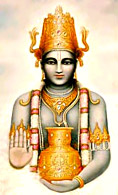 Lord Dhanwantri is an incarnation of Lord Vishnu. He is considered as the God of Ayurveda. People seek his blessings for good health from Lord Dhanwantari. The credit of having discovered antibacterial properties of the turmeric goes to him. He is said to have initiated modern methods like plastic surgery. He is probably to have taught methods of surgery to father of Ayurvedic surgery, Susrutha. He is believed to be the brother of Goddess of wealth Lakshmi.
Lord Dhanwantri is an incarnation of Lord Vishnu. He is considered as the God of Ayurveda. People seek his blessings for good health from Lord Dhanwantari. The credit of having discovered antibacterial properties of the turmeric goes to him. He is said to have initiated modern methods like plastic surgery. He is probably to have taught methods of surgery to father of Ayurvedic surgery, Susrutha. He is believed to be the brother of Goddess of wealth Lakshmi.
Dhanwantari`s appearance is celebrated each year on the 13th day of the waxing moon a few days before the Diwali. Nothing is known for sure as to how Dhanwantari looked but some slokas say he was dark and wore yellow clothes and somewhere he is said to be fair with a happy face. He looks like Vishnu with medical herbs in his hands. He was one of the nine gems in the court of Vikramaditya due to his achievements in the medicine field.
Lord Dhanwantari`s birthday is celebrated on Dhanteras, two days before Diwali.
Hindus know Dhanwantari as the celestial healer and physician of the Gods. Lord Dhanwantari is regarded as the god of Ayurvedic medicine in the Hindu religion. He is thereby the father of medical science. His teachings are recorded in Agni Purana.
This article is a stub. You can enrich by adding more information to it. Send your Write Up to content@indianetzone.com.




















